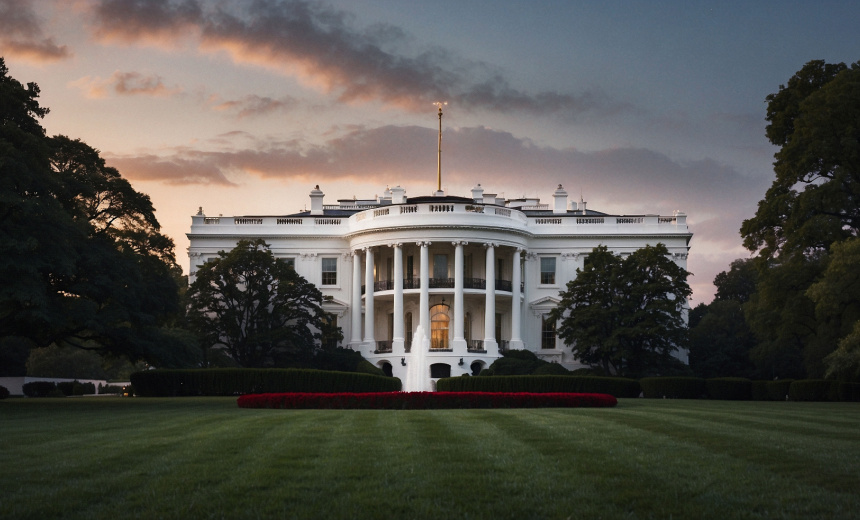Artificial Intelligence & Machine Learning
,
Next-Generation Technologies & Secure Development
Experts Warn White House AI Action Plan Could Prioritize Deregulation Over Security

The Trump administration pledged Wednesday an offensive against “red tape” hindering artificial intelligence developers in federal and state governments while vowing to ensure that such systems are objective “rather than pursuing social engineering agendas.”
See Also: Delivering ROI on AI: How AI transforms customer support efficiency
The White House said its agenda would be reflected in three executive orders President Donald Trump is set to sign in the afternoon following publication of a strategic plan officials say will ensure the United States is global AI leader. The plan calls for expanding exports of emerging technologies, fast-tracking energy access for data centers and cutting off federal funding to states with “burdensome AI regulations that waste these funds.”
Tech giants and AI leaders hailed Trump’s plan with NetChoice – a trade group backed by Google and Meta – praising its “focus on red tape reduction” and calling the shift from the prior administration’s policies “effectively night and day.” But the plan could undercut AI security by limiting states’ ability to address documented harms, warned Samir Jain, vice president of policy at the Center for Democracy and Technology.
“The government should not be acting as a Ministry of AI Truth or insisting that AI models hew to its preferred interpretation of reality,” Jain said in a statement sent to Information Security Media Group shortly after the plan was unveiled. Jain described the guidance as “a missed opportunity,” adding that while it includes “some positive elements” the administration is “largely failing to address the ways in which [AI] could potentially harm people.”
The strategy says the Office of Science and Technology Policy will solicit from private industry comments of which federal regulations it believes hinder AI innovation and adoption. The United States – unlike the European Union, which opted for comprehensive regulation – does not have an overarching statute addressing AI issues. Regulators have instead relied on existing laws such as anti-discrimination measures to police the technology. Some statehouses, perceiving a regulatory vacuum, have attempted their own laws – to mixed success.
The Office of Management and Budget will work to tie federal funding sent to states to a regulatory climate the White House considers favorable to AI implementation. The Federal Communications Commission will be asked to evaluate whether state AI regulations limit its authority while the Federal Trade Commission is set to receive guidance asking it to review previous AI-related consent orders and undo any that “unduly burden AI innovation.”
A previous federal push to limit state power over AI regulation sparked sharp debate in Washington, with a proposed 10-year moratorium on state AI laws being dropped from a budget bill enacting large swathes of the Trump agenda (Senate Strips AI Moratorium Amid Sharp Bipartisan Opposition).
On his first full day back in office, President Donald Trump revoked an executive order enacted under the Biden administration that sought to hasten AI implementation while also ensuring that it is safe and secure. Trump promised a deregulatory strategy to spur private-sector innovation (see: President Trump Scraps Biden’s AI Safety Executive Order).
Trump’s plan centers on three pillars: accelerating innovation, building infrastructure and leading in international diplomacy and security. Analysts previously told Information Security Media Group that any data center expansion should come with tighter security, citing concerns that China has infiltrated critical U.S. infrastructure to disrupt energy and other essential services in the event of a future conflict over Taiwan.
“We need to build and maintain vast AI infrastructure and the energy to power it,” the plan reads. “To do that, we will continue to reject radical climate dogma and bureaucratic red tape, as the administration has done since Inauguration Day.”
The plan includes measures supported among the emerging technology community, including investments in AI interpretability and control, and funding advancements through a forthcoming national AI research and development strategic plan.
The strategy also calls on the National Institute of Standards and Technology to lead the development of an “AI evaluations ecosystem” to better assess the performance and reliability of AI systems.
While industry groups welcomed the plan’s focus on deregulation, Bryan Cunningham, president of Liberty Defense and a former White House lawyer, warned it “cannot come at the expense of losing all federal government knowledge” and ability to take action if private AI systems pose risks to national security, privacy and civil liberties.
“The devil will be in the details and the implementation plans,” he added.
Before the president signed three AI executive orders in support of the White House AI Action Plan late Wednesday afternoon, White House AI and cryptocurrency advisor David Sacks told reporters the administration believes “that AI systems should be free of ideological bias and not be designed to pursue socially engineered agendas.” Sacks said the orders require federal agencies to contract only with developers whose AI models are deemed “free from top-down ideological bias.”
Other White House officials defended the move against criticism, including Office of Science and Technology Policy Director Michael Kratsios, who said the initiative will “allow free speech and expression to flourish.”
Trump delivered remarks in an order signing ceremony, which also aimed to boost domestic energy production and expand AI data centers, open federal land for facilities, speed up power grid connections, ease permitting and prioritize grid access for nearly completed energy sites.
Trump acknowledged that blocking states from setting their own AI regulatory frameworks was seen by some as “unpopular,” but defended the decision, saying, “We need one common sense federal standard that supersedes all states.”
“You can’t have one state with standards that are so high that it’s going to hold you up,” Trump said. “If you are operating under 15 different sets of state laws the most restrictive state of all will be the one that rules.”
Updated July 23, 2025 22:12 UTC: This story has been updated throughout.
